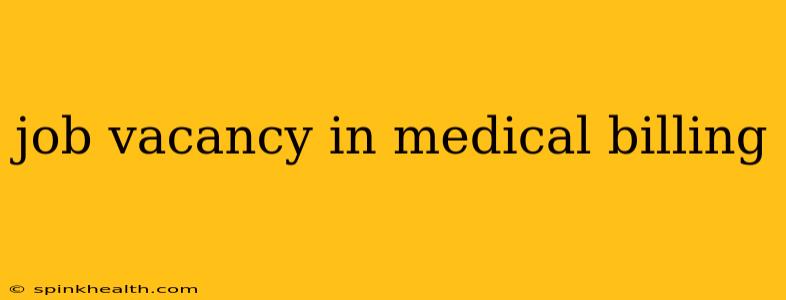Navigating the World of Medical Billing Job Vacancies: A Seeker's Guide
The world of medical billing is a dynamic and often overlooked sector, teeming with opportunities for those with a knack for numbers, attention to detail, and a commitment to accuracy. But finding the right medical billing job vacancy can feel like searching for a needle in a haystack. This guide aims to illuminate the path, sharing insights and strategies to help you land your dream role.
My journey into the medical billing field began unexpectedly. A friend, struggling with the administrative side of her small medical practice, asked for help. What started as occasional assistance blossomed into a passion for the intricate dance of codes, claims, and reimbursements. This experience sparked my interest, leading to further education and a rewarding career. Through this story, I hope to offer you valuable tips based on both personal and professional experience.
What are the common job titles in medical billing?
This is a frequently asked question, and the answer isn't always straightforward. Job titles can vary widely depending on the size and structure of the medical facility. You might encounter titles like:
- Medical Biller: This is the most common entry-level position, focusing on the day-to-day tasks of submitting claims, following up on denials, and managing patient accounts.
- Medical Billing Specialist: This often involves more advanced responsibilities, such as analyzing billing data, identifying trends, and implementing improvements to the billing process.
- Medical Billing Manager/Supervisor: This role involves overseeing a team of billers, ensuring accuracy and efficiency, and often managing billing software.
- Revenue Cycle Specialist: This broader role encompasses all aspects of revenue generation, from patient registration to collections, with medical billing as a key component.
- Medical Coder: While not strictly billing, medical coders play a crucial role by assigning the correct codes to medical procedures and diagnoses, which are essential for accurate billing.
Where can I find medical billing job vacancies?
Finding the right vacancy requires a multi-pronged approach. Don't rely on just one method!
- Online Job Boards: Sites like Indeed, LinkedIn, Monster, and Glassdoor are excellent starting points. Use specific keywords like "medical biller," "medical billing specialist," "revenue cycle," and the name of your preferred software (e.g., "Epic," "Cerner").
- Company Websites: Directly check the careers pages of hospitals, clinics, physician practices, and medical billing companies. This shows initiative and allows you to tailor your application.
- Networking: Attend industry events, connect with professionals on LinkedIn, and reach out to your existing network. Word-of-mouth referrals often lead to the best opportunities.
- Recruitment Agencies: Specialized healthcare recruitment agencies can help you find suitable vacancies and offer guidance throughout the hiring process.
What skills are needed for a medical billing job?
Medical billing is more than just data entry. Successful billers possess a combination of hard and soft skills:
- Technical Skills: Proficiency in medical billing software, knowledge of medical coding (CPT, ICD, HCPCS), and understanding of insurance regulations (Medicare, Medicaid, private payers).
- Analytical Skills: The ability to analyze billing data, identify trends, and pinpoint areas for improvement.
- Communication Skills: Excellent communication is crucial for interacting with patients, insurance companies, and colleagues.
- Problem-Solving Skills: Billers frequently encounter issues with claims denials, requiring effective problem-solving abilities.
- Attention to Detail: Accuracy is paramount in medical billing; even a small mistake can have significant consequences.
What is the salary range for medical billing jobs?
Salary expectations vary widely based on experience, location, and employer type. Entry-level positions typically start at a lower range, while experienced professionals can command higher salaries. Researching average salaries in your area is crucial for setting realistic expectations.
What qualifications are typically required for medical billing jobs?
While some entry-level positions may not require a specific degree, many employers prefer candidates with a certificate, associate's degree, or bachelor's degree in medical billing and coding, healthcare administration, or a related field. Relevant experience can also significantly enhance your candidacy.
Finding the perfect medical billing job vacancy is a journey, not a sprint. By utilizing these strategies, honing your skills, and maintaining a positive attitude, you'll significantly increase your chances of landing your dream role in this rewarding field. Remember, your dedication and passion for accuracy can set you apart. Good luck on your search!

